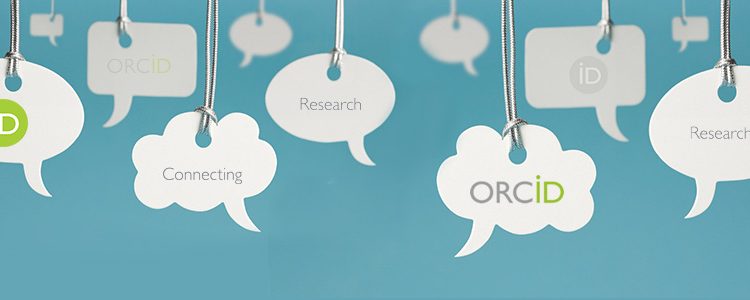Experts’ Take on ORCID

What’s in a name? Nothing, according to Shakespeare, but a researcher thinks otherwise. We want credit for our work and don’t want to give credit to anyone else, or take credit for any work but our own. This is a real problem in today’s publishing environment. If you have a common name such as William Stevenson, it is likely that there is someone else out there publishing under the same name or one close enough to it to cause confusion. I’ve never lived in a city in which there were not several other William Stevensons, and if I ever become a novelist, I’ll have to use a pen name, since there is already a bestselling novelist with my name.
In scientific publishing, the situation is particularly bewildering in Asia where so many names are similar. According to Nature in 2011, there were 3,926 publications by various authors named Y. Wang, more than ten per day. Papers by Chens, Lees, Zhangs, and Lis were almost as common. So how can we be sure of who is who?
A possible solution to this confusion is the Open Researcher and Contributor ID (ORCID) which was launched in October 2012. The goal is to assign to every researcher or institution a unique 16-digit identifying code that can be included in a publication, thus ending any doubt as to which Stevenson or Lee did the work. There is no charge for an individual researcher. To register, all a researcher needs to do is to log on to the ORCID website at https://orcid.org/ and type in his or her name and email address. The researcher may also list publications, affiliations, and other information. This becomes a permanent identifier that can be linked to his or her scientific contributions, even data sets generated through research, and that can track all research outputs, turning the ORCID profile into a digital curriculum vitae.
Institutions and publishing houses are charged a fee for their membership in ORCID, which can be pretty hefty—$25,000 for the largest institutions. Their members include prestigious publishers, Elsevier, Springer, Nature, and Wiley, and universities such as Cornell and Caltech. Funding organizations are requesting ORCID for grant submission, and professional associations too are incorporating them into membership renewal. As of August 15, 2014, the number of registrants was 838,549. Watching from the stands are big names such as the American Chemical Society, perhaps waiting to see if ORCID turns out to be another Facebook or MySpace.
I’m all in favor of a service like ORCID and encourage all researchers to register with them. Maybe in ten years, a universal identifier code will be as common as an email address.
Let’s see the views of some of our industry experts on this topic.
Our Experts’ Opinions on ORCID
This system will eliminate any possibility that transgressions, such as data faking and plagiarism, be mistakenly associated with the wrong person.
PhD, Environmental Science (25+ years of Research and Technical Writing experience, US)
I view such developments as long overdue. With the computing infrastructure that exists today and the huge number of contributors to academic work, it only makes sense to make the process of finding a given author’s work as efficient as possible. There is so much information available that it is of primary importance to speed up the sorting process so that the desired information can be quickly located and more time be spent on using, as opposed to finding, information. ORCID, for researchers, accounts for slightly more than 10% of ISNI membership. While I suppose it is possible for people to object to being identified by a number or code, I cannot see that this is a justified objection since I highly doubt that anyone would introduce a speaker at a conference by his number! One of the most important aspects of these unambiguous registries is that, with an increasingly competitive research environment prompted by funding scarcity and tenure requirements, this system will eliminate any possibility that transgressions, such as data faking and plagiarism, be mistakenly associated with the wrong person. ORCID could potentially be used to identify fake reviewers, however, since the names of reviewers are generally known only to the publishers, it would be their responsibility to search the reviewer’s names to make sure they were legitimate experts in their fields, the problem being that these fake reviewers would not have ORCID identification. Therefore, ORCID is primarily useful for preventing mistaken association of academically unethical practices with the wrong researchers.
It is likely to be of only limited use until it is implemented widely.
PhD, Molecular and Cellular Biology (10+ years of Scientific and Editing Experience, US)
ORCID will be a very useful tool for researchers worldwide. It will be particularly helpful for identifying specific researchers with very common names and initials, such as Smith, Wu, Yan, Cohen, and Wei. It will also facilitate the identification of first and last names from cultures (such as eastern and western) that tend to use different conventions. Nevertheless, the rollout of the ORCID could well be problematic, and it is likely to be of only limited use until it is implemented widely. For example, it is important that all journals worldwide embrace the technology so that users can be confident about identifying the correct individual and/or all the appropriate studies. In the United States, researchers in academia already have eRA Commons identifiers for NIH grants, and it will be interesting to see how those identifiers relate to ORCID.
It is
an important step to build a more organised track record of scientific publication, and gives the possibility to each author to build up a unique longstanding profile.
PhD, Chemistry (12+ years of Scientific, Editing, and Science Communication Experience, UK)
I still remember my great surprise as a researcher in computational chemistry at UCL to discover that I had 20 publications according to WoK, although I had published only 8 papers!
Initially, I took this with a bit of pride but that lasted only for a second, after which it left room for frustration as I realized that having homonymous authors did not help the life of scientists sourcing bibliography.
Despite the precise information required for surname spelling and initials, a simple search by author’s name in WoK can lead to a long list of works, which span from biology to geophysics.
I also experienced another problem as I tried to track works from my supervisor in materials modelling back at a time when she was still not married. It took me a long time to find her articles and that was only possible because she had communicated to me her old surname.
The possibility of having an ID associated to individual authorships offered by the ORCID platform is an important step to build a more organized track record of scientific publications.
The open source nature also guarantees easy access both to people in the scientific community and the media, an important part of the scientific culture that helps scientific research reach the public.
Sponsored and adopted by leading institutions and charities on the world such as Nature Publishing Group and Wellcome Trust, ORCID gives every researcher the possibility to build up a unique long-standing profile within a framework that guarantees copyright maintenance. In addition, it also offers researchers and other institutions the opportunity of open access sources.
M
uch needed platform…failing to link all output activities and researchers to their respective ORCIDs, this platform risks becoming a mere administrative hassle.
PhD, Biology (12+ years of Scientific and Editing Experience, UK)
The ORCID unique research identifier provides a much needed platform to link individual researchers to their output, disambiguating researchers with similar names. Publishers, research centers, students and researchers can link their activities to individual identifiers.
The challenge here comes from the need to reinforce the use of these identifiers to make them useful for academics. Failing to link all output activities and researchers to their respective ORCIDs, this platform risks becoming a mere administrative hassle. Currently, some of the major research publishers already enforce the provision of an ORCID identifier upon acceptance of a manuscript for publication; however, this is not yet true for the growing number of scientific publishers worldwide. Different universities have also developed different indexing methods to measure staff output, and output indices vary among funding agencies, further preventing ORCID from becoming the universal tool that tracks, evaluates and reports research work—as it is intended for.
ORCID is a first attempt to develop a universal tool to credit individual work, and its enforcement from major publishers will sure help its establishment in the future. However, much work is yet needed to ensure that researchers and academic institutions truly benefit from this initiative.
It is h
ighly effective to introduce the numbering system for the author’s names…China and Korea have the least variation of family names in the world, approximately 4,100 and 250, respectively.
MS, Information Technology (11+ years of English-Japanese Translation experience, Japan)
One of the confusions which numerous researchers often encounter when citing papers, particularly in the case of those written by authors with East Asian origins, is that many of them have exactly the same first and last names. Statistically speaking, China and Korea have the least variation of family names in the world, approximately 4,100 and 250, respectively. In the case of Korea, 21.6% of its nationals have the family name “Kim,” followed by “Lee” for 14.8%, 8.5% for “Park,” etc. As for Chinese family names, 7.25% for “Wang,” 7.19% for “Lee,” followed by “Zhang” or “Chang.” On the contrary, the countries that have the largest variation of family names are the United States (1.5 million) and Italy (350,000) followed by Japan (300,000).
As seen above, in case of referencing academic papers written by researchers from those two nations in particular (China and Korea), it is highly effective to introduce a numbering system such as ORCID for authors’ names in order to avoid confusion and make citation work less time-consuming. Even if the researchers are not from those two nations, it is possible that different authors have identical names. For example, certain Japanese names may have the same pronunciation, but the Kanji used for those can often differ.
In conclusion, the ORCID or ISNI systems are more logical and scientific, and must be promoted further as an industry standard.
ORCID
…increase transparency by linking research activities and outputs in the identification system.
MA, Interdisciplinary Studies (10+ years of Research and Academic Editing experience, US)
Connecting researchers to their work can present challenges when faced with diverse research formats, international information systems, and complex names. ORCID (Open Researcher and Contributor ID) is a system that provides every researcher with their own 16-digit code as a fixed, unique identifier. This personal code is used to distinguish work by researchers across different disciplines, institutions, and countries. Each researcher will have their own identification code that makes it simple to find their individual contributions, in the form of articles, experiments, patents, etc. Aside from simplifying the process of entering and retrieving identification data, ORCID will also increase transparency by linking research activities and outputs in the identification system.
ORCID and ISNI (International Standard Name Identifier) are cooperating on the task of providing standardized identifiers. ISNI has reserved a block of identifiers for ORCID to avoid any overlap in code assignments. Although ORCID and ISNI differ in terms of the data held, rules applied, services offered, and communities served, the two organizations are similar in their goal of transparently linking contributors to their work.
As an a
dministrative tool for transmission of author information between organizations, a registry of unique identifiers will facilitate accuracy and convenience.
PhD, Cancer (12+ years of Scientific and Medical writing Experience, AU)
During exchanges at conferences, recognition of names and faces facilitates recall of pertinent research efforts, and name ambiguity is rarely a problem. Subsequent literature searching and citation are also unlikely to produce ambiguity or mistaken acknowledgements, because author names are always associated with identifying information such as nationalities, institutions, and email addresses. Nonetheless, as an administrative tool for transmission of author information between organizations, a registry of unique identifiers will facilitate accuracy and convenience. Moreover, access to complete author information may ensure transparency of grant, patent, and manuscript submissions by preventing omission of conflicting interests. However, as a database of complete research portfolios, ORCID may primarily disseminate researcher achievements, merely acting as purposely exhaustive aids to professional media networks such as LinkedIn.









